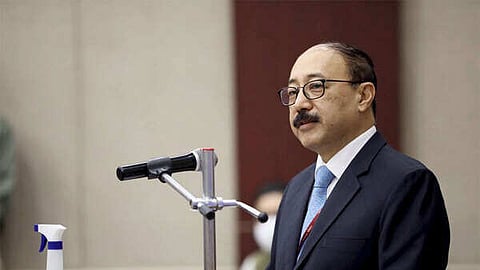Military conflict during Operation Sindoor signals deeper China-Pak bond: Shringla
The military conflict during Operation Sindoor was indicative of a deeper China-Pakistan strategic partnership, former Foreign Secretary Harsh Vardhan Shringla has said. He also noted that China's involvement has extended beyond defence supplies to include intelligence and diplomatic support, forming an 'all-weather' alliance intended to constrain India's rise. Shringla spoke on India's foreign policy and strategic affairs on Monday during an interaction organised by the Pune International Centre (PIC) and moderated by former Indian Ambassador to China Gautam Bambawale. He stated that India's foreign policy reflects a balance between realism and idealism, guided by developmental imperatives, strategic autonomy, and an inclusive global outlook. Shringla, who also served as India's Chief Coordinator for the G20 Presidency, shared his perspectives on the country's evolving foreign policy, regional dynamics, and strategic priorities in a rapidly changing global order.
The discussion spanned critical themes, including India's relations with China and Pakistan, the changing nature of modern warfare, and the increasing role of technology, drones, and cyber tools in defence and diplomacy, according to a release issued by the PIC. Shringla underlined the importance of strategic deterrence, skilled diplomacy, and a clear focus on domestic growth to strengthen India's international position. Addressing questions on Pakistan's use of Chinese weaponry during Operation Sindoor, he described the conflict as "indicative of a deeper China-Pakistan strategic partnership". He noted that China's involvement extended beyond defence supplies to include intelligence and diplomatic support, forming an 'all-weather' alliance intended to constrain India's rise, and called for a response through capacity building, innovation, and partnerships grounded in India's strategic interests. On the Pakistan-US dynamic after Operation Sindoor, Shringla observed that Field Marshal Asim Munir had consolidated authority and regained Washington's attention under the Trump 2.0 administration. Drawing from his experience as India's Ambassador to the United States, he contrasted Pakistan's short-term tactical approach with India's long-term, institutional diplomacy, according to a release.
He highlighted that India's strength lies in building durable partnerships across the US, Europe, the Indo-Pacific, and the Global South, anchored in shared democratic values, trade, technology, and security cooperation. Shringla stressed that India does not accept third-party mediation in bilateral issues, in accordance with the Simla Agreement, and observed that the abrogation of Article 370 has integrated Jammu and Kashmir into the national mainstream, thereby restoring stability, except for sporadic incidents of cross-border terrorism. Speaking on regional and global balancing, he highlighted the importance of the 'Neighbourhood First' policy, alongside deeper engagement with the Global South, West Asia, and Southeast Asia, the release added. He also highlighted India's ambition to emerge as a "thought and technology" leader, citing the upcoming Global AI Summit as a key step in shaping governance frameworks for emerging technologies. Discussing the US-China strategic rivalry, Shringla remarked that while the global order appears to be moving toward a G2 framework, India must not cede its strategic space. He asserted that India's growing economic and technological capacity positions it as an indispensable third pole in a multi-polar world. He urged a focus on strengthening domestic ecosystems in semiconductors, renewable energy, artificial intelligence, pharmaceuticals, and rare earths to reinforce India's global standing, the release added.
.png)


